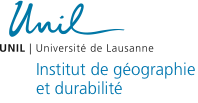Institute of Geography and Sustainability of the University of Lausanne
Research projects
Achieving SDG 14 in East Africa: a socio-ecological approach to understanding success and failure
| Research fields |
Political ecologies |
| Keywords |
SDG14 Knowledge Policy; Socio-ecological Marine; Implementation Political ecology Collaboration |
| Funding | Swiss National Science Foundation |
| Duration | February 2021 - Juin 2022 |
| Website | http://p3.snf.ch/project-199553 |
| Researchers |
Andriamahefazafy Mialy Zanah (Principal Investigator) Failler Pierre (Supervision) |
The Sustainable Development Goals (SDGs) have become a key driver for the development of public policies, decision-making and policy change in many countries. For African countries, ensuring the sustainable use of the ocean is now a priority under their blue economy strategy that often refers to SDG 14 and associated targets (Childs & Hicks, 2019). The case of SDG 14 is important and timely as it is one of the slowest progressing goals with very limited achievement (Salvia et al., 2019; United Nations, 2019). Research on SDG 14 focusses on analysing its interactions with other SDGs and global policies defined by international regimes (Obura, 2020; Singh et al., 2018). A few studies, so far, looked at national achievements of SDG 14 and especially challenges of implementation (Gulseven, 2020; Rivera-Arriaga & Azuz-Adeath, 2019). My project aim is to investigate the implementation and achievement of SDG 14 at country levels and produce a framework for reporting progress towards SDG 14 that considers national contexts and capabilities. I will use the case of East Africa and focus on three countries - Madagascar, Kenya and Seychelles - where implementation has led to different results (Sachs, J. et al., 2020). I will look at four targets of SDG 14 that are due to be reached by 2020. I chose these four targets because they are the first targets supposed to be achieved under SDG 14 and makes the examination timely. My project has two specific objectives. First, it will analyse the drivers behind the progress - or lack of progress - towards the achievement of the four SDG 14's targets. Using a socio-ecological system approach (du Plessis, 2008), my research will explore the common socio-ecological and political drivers and specificities that made some countries better achieve SDG 14 than others. Second, I will explore the applicability of current ways of reporting progress towards SDG 14 in East Africa. My research will look beyond global indicators and integrate diverse knowledge systems (Lam et al., 2020). It will investigate how the East African context and national knowledge on the ocean can be better integrated in the existing monitoring of SDG 14 achievement. The research will mobilise both a qualitative and an empirical approach. I will perform a systematic review and interviews of stakeholders as methods. The research sits in the field of social sciences and combines insights from bottom-up approaches to policy implementation (Sabatier, 1986) and political ecology of environmental knowledge (Bryant, 1998). This combination will open up the study of implementing SDG 14 to questions of national policy-making and institutional capabilities along with consideration of ecology, socio-economics and politics. Similarly, the two fields will be enriched by the study of SDG 14. SDG 14 is part of an international commitment with national and local implications for local communities and environmental management. The expected results will be empirical and theoretical. For practitioners, my project will provide a regional perspective on the achievement of SDG 14 and will serve as lessons learnt to other countries that have similar socio-economic and ecological contexts as the three countries studied. As African countries have widely adopted the discourse of achieving SDG 14, I will bring the innovation of analysing the implementation of such discourse through investigation of national practices. Theoretically, my project will bring an interdisciplinary approach to the analysis of international commitments' implementation at national levels. It will also enrich the scholarship on knowledge and global policy analysis by contextualising the production and mobilisation of knowledge about the ocean and SDG 14 according to the East African experience.

